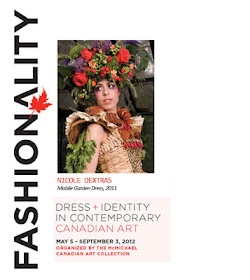Fashionality:
1. One's personality expressed in their clothing, “fashion personality.”
2. One's nationality expressed in their clothing, “fashion nationality.”
—The Urban Dictionary
Today is Canada's 145th birthday and it seemed like the perfect day to post about Fashionality: Dress and Identity in Contemporary Canadian Art at the McMichael Gallery in Vaughan, Ontario. I've extracted parts from the press release below to present an overview of the show, and it is clear that this would have been the perfect venue for my beaded and embroidered hockey equipment from my recent show Constructions of Femininity at loop gallery.
“Fashionality” is a newly coined play on words that refers to the visual culture and semiotics of dress and adornment. Combining the words “fashion,” “personality,” and “nationality,” it signals the interplay between clothing, identity, and cultural affinity. Taking the idiom of dress as a starting point, Fashionality: Dress and Identity in Contemporary Canadian Art explores the use of apparel in the work of twenty-three contemporary Canadian artists. It considers the diverse ways in which the clothed body and the idiom of dress are employed as sources of inspiration, humour, and critique, and as sites for the exploration of issues of identity, hybridity, and self-expression. Not strictly about fashion, the exhibition explores the ways in which the subjectivities and identities of those living in Canada are expressed, deconstructed, and reconfigured, while raising some intriguing questions about the embodied Canadian subject.
The exhibition is divided into four themes. The first gallery embraces the acts of creation and recreation. Here the focus is on artists whose work foregrounds relationships with nature, apparel-making, sports, and social media. Of note here are items of protective hockey equipment which have been embellished by living honeybees, an act orchestrated by Winnipeg artist Aganetha Dyck. Another project involves 365 days worth of hand-made clothing which was the result of a year-long daily dressmaking project blogged by Vancouver artist and designer Natalie Purschwitz. Asserting that First Nations not be relegated to the narratives of a primitive past, Oji-Cree artist KC Adams makes computer bags from fur and leather, and applies indigenous beading techniques to iPod and iPad holders.
The consecutive gallery considers the life cycle, and focuses on ghostly apparitions and unworn garments. Pointing to the domestic "uniform," the south wall is resplendent with hundreds of brightly-hued transparent aprons assembled by Newfoundland artist Barb Hunt. Conversely, the north wall seems to be alive with hundreds of tiny woolen sweaters, knitted by Ontario-based artist Michele Karch-Ackerman and several volunteers, in commemoration of Canadian soldiers who fell in World War I. In between these two astonishing assemblages are a number of intriguing works that speak to the vagaries of domestic life, real and imagined histories, the feminine “mystique,” and the confines of masculine imperatives.
The third gallery centers upon that quintessential Western symbol of woman: the dress. A blast of colour and energy, paintings and photographs hung here exude a love of cloth, colour, texture, and movement. Nicole Dextras's remarkable photographs of frozen gowns appear to dance next to Barbara Pratt's immaculate painted homages to haute couture. Waiting in the wings is a column of Gathie Falk's shoe boxes containing twelve pairs of colourful papier mâché pumps, while one of Barb Hunt's black plasma-arc cut flat steel dresses leans on a nearby wall.
In the final gallery the visitor becomes part of a conversation about culture and gender. Showcased here are works by a number of artists who have turned to clothing to express their personal, political, and cultural identities. Stereotypical renderings of Indian chiefs and squaws, lumberjacks, fashion models, and beauty queens are deconstructed and reconfigured through kitsch, camp, and a decided roasting of Canada's colonial imperatives. Lori Blondeau's Cosmosquaw cover girl, Kent Monkman's High-Heeled Moccassins, and Janet Morton's absurdly oversized plaid lumberjack shirt (entitled Canadian Monument #2), strongly suggest that any typecasting of Canada's diverse demographic is long overdue for a makeover.
The exhibition runs until September 3, 2012. Happy Canada Day!
Notice of copyright:
All text and images on this blog are the copyright of Ingrid Mida, unless otherwise noted. The copying of posts, images and/or text without proper attribution is violation of copyright and legal action will be pursued.
All text and images on this blog are the copyright of Ingrid Mida, unless otherwise noted. The copying of posts, images and/or text without proper attribution is violation of copyright and legal action will be pursued.
